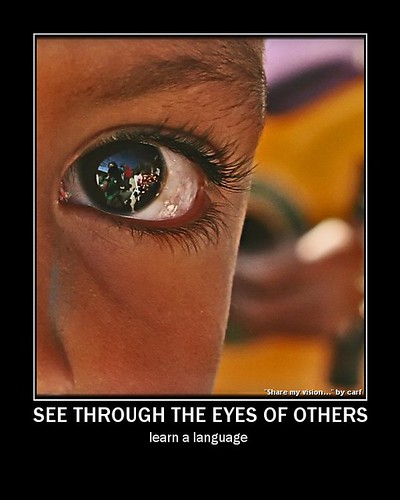 One of the sessions I attended at the PLS was all about using Fairytales and Fables in PLL and employing children’s thinking skills. It was led by Louise Harty from Northumberland, and spoke to the wonderful resources available on the NGfL – particularly Riccioliodoro and Les souris courageuses
One of the sessions I attended at the PLS was all about using Fairytales and Fables in PLL and employing children’s thinking skills. It was led by Louise Harty from Northumberland, and spoke to the wonderful resources available on the NGfL – particularly Riccioliodoro and Les souris courageuses
As I admitted to Louise when I saw here later, I’ve used the resources on the NGfL, specifically Goldilocks and Little Red Riding Hood in Spanish, and have made use of some of the activities discussed during the session without really grasping the full power of them. So it was good to discover the thinking and theory behind it all.
This has implications for thinking skills – Louise opened by reflecting that learning should be active, meaningful, challenging, collaborative, mediated and reflective. She talked about Lev Vygotsky and his zones of proximal development. Vygotsky felt that it is children’s interaction with others through language that most strongly influences the levels of conceptual understanding they can reach. He also believed that we can learn from others, both the same age and of a higher age and developmental level – learning is a social activity and thinking skills could be the road to better language learning.
The progression of learning in PMFL was said to be
- nouns
- words to describe nouns
- short phrase
- making own sentences
- able to use verbs confidently
and the scheme of learning activities that Louise was presenting follow this pattern.
At each stage, opportunities are given to explore concepts behind the knowledge in an unthreatening manner.
Here are the success criteria for each objective-
- nouns – I understand gender (not teaching it but exploring it)
- adjectives – I understand how adjectives work
- short phrases – I understand simple word order.
- sentences – I understand sentence construction
- use verbs confidently – I understand how verbs work
By using scaffolding early on, pupils in PMFl can reach level 5 equivalent skills. Louise questioned why, if pupils are conceptually able to reach level 5 in Maths science and Literacy, we limit them in MFL?
By moving from fairytales to fables the pupils are moving from familiar to less familiar stories with more complex language.

Ricciolodoro è i Tre Orsi was the first story in focus.
By using Storyboarding pupils were developing sequencing and deductive skills. They went on to classifying nouns, exercising sorting and clasifying skills, using language of similarity and differences whilst making connections. They ahve to articulate their reasoning with everyone bringing their own learning and skills
We did an activity in which we were exploring gender – not being taught it but discovering it. If you present ‘the cognitive conflict’ children discover for themselves and it much more powerful than being told.
Les souris courageuses – une fable
We began loo king at the activity Map from memory, a visual, walking dictation type of activity in which we were communicating the position of items in a picture from memory wthout touching. The key was – How did we tackle the task? Were we methodical and divide the picture into sections? Did we look for likely places to put words? Did we match adjectives in advance of instructions?
king at the activity Map from memory, a visual, walking dictation type of activity in which we were communicating the position of items in a picture from memory wthout touching. The key was – How did we tackle the task? Were we methodical and divide the picture into sections? Did we look for likely places to put words? Did we match adjectives in advance of instructions?
We then moved onto the construction of phrases and sentences using a grid, then joining with connectives. Although some may not be strictly correct in terms of likelihood or sense, in the feedback you get quality of language. Louise emphasised that the teacher’s role is facilitating in thsi scenario rather than giving learning. In this exercise, the thinking was interpreting and oragnising info whilst the children were talking about how to work together as a team – team strategies lead to spontaneous language.
The next activity involved a Venn diagram which we used for making deductions about adjectives. Conclusions reached included that you often add an e to make feminine adjectives and ones that are the same end in e already. The exercise then gave opportunities for more sentence making opportunities.
Sadly Louise ran out of time to explain the Fortune line and Fact or fiction, but we did have a quick look at classifying verbs, matching infinitives to verb forms and then splitting the verb cards as we saw fit. We were encouraged to split them into description and action verbs, and then to discuss our conclusions.
The interactive stories and SMART notebook files of characters and for retelling the story are available on the NGfL website and the accompanying resources are available for purchase £149.
I’ve used the Goldilocks stuff in Spanish very successfully with Year2 who discovered all sorts of things about language through it. And now I understand why!!














